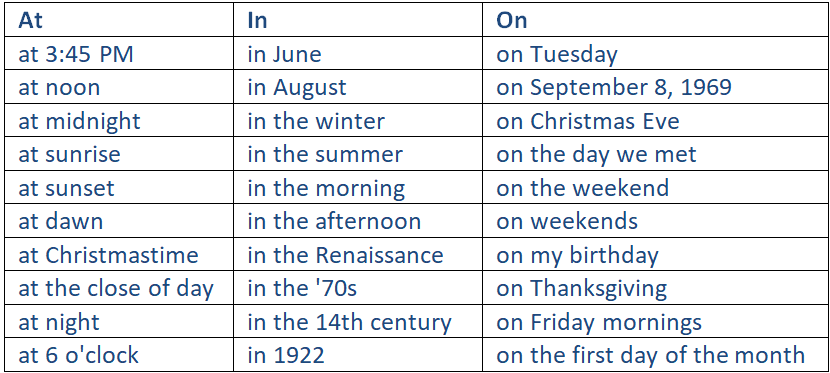

Grammar


Tenses


Present

Present Simple

Present Continuous

Present Perfect

Present Perfect Continuous


Past

Past Simple

Past Continuous

Past Perfect

Past Perfect Continuous


Future

Future Simple

Future Continuous

Future Perfect

Future Perfect Continuous


Parts Of Speech


Nouns

Countable and uncountable nouns

Verbal nouns

Singular and Plural nouns

Proper nouns

Nouns gender

Nouns definition

Concrete nouns

Abstract nouns

Common nouns

Collective nouns

Definition Of Nouns

Animate and Inanimate nouns

Nouns


Verbs

Stative and dynamic verbs

Finite and nonfinite verbs

To be verbs

Transitive and intransitive verbs

Auxiliary verbs

Modal verbs

Regular and irregular verbs

Action verbs

Verbs


Adverbs

Relative adverbs

Interrogative adverbs

Adverbs of time

Adverbs of place

Adverbs of reason

Adverbs of quantity

Adverbs of manner

Adverbs of frequency

Adverbs of affirmation

Adverbs


Adjectives

Quantitative adjective

Proper adjective

Possessive adjective

Numeral adjective

Interrogative adjective

Distributive adjective

Descriptive adjective

Demonstrative adjective


Pronouns

Subject pronoun

Relative pronoun

Reflexive pronoun

Reciprocal pronoun

Possessive pronoun

Personal pronoun

Interrogative pronoun

Indefinite pronoun

Emphatic pronoun

Distributive pronoun

Demonstrative pronoun

Pronouns


Pre Position


Preposition by function

Time preposition

Reason preposition

Possession preposition

Place preposition

Phrases preposition

Origin preposition

Measure preposition

Direction preposition

Contrast preposition

Agent preposition


Preposition by construction

Simple preposition

Phrase preposition

Double preposition

Compound preposition

prepositions


Conjunctions

Subordinating conjunction

Correlative conjunction

Coordinating conjunction

Conjunctive adverbs

conjunctions


Interjections

Express calling interjection

Phrases

Sentences


Grammar Rules

Passive and Active

Preference

Requests and offers

wishes

Be used to

Some and any

Could have done

Describing people

Giving advices

Possession

Comparative and superlative

Giving Reason

Making Suggestions

Apologizing

Forming questions

Since and for

Directions

Obligation

Adverbials

invitation

Articles

Imaginary condition

Zero conditional

First conditional

Second conditional

Third conditional

Reported speech

Demonstratives

Determiners

Direct and Indirect speech


Linguistics

Phonetics

Phonology

Linguistics fields

Syntax

Morphology

Semantics

pragmatics

History

Writing

Grammar

Phonetics and Phonology

Semiotics


Reading Comprehension

Elementary

Intermediate

Advanced


Teaching Methods

Teaching Strategies

Assessment
Time Preposition
المؤلف:
ENGLISHPAGE.COM
المصدر:
...
الجزء والصفحة:
...
31-5-2021
1050
Time Prepositions
There are two types of time prepositions in English. First, we will take a look at the basic time prepositions at, in, and on. Secondly, we will cover the functional time prepositions after, before, by, during, for, from, in, to and until/till.
Basic Time Prepositions
The prepositions at, in and on are associated with specific time categories, which must be memorized. For example, we say "at 5 PM on Sunday in June" because English speakers use at with clock times, on with days, and in with months. Study the categories and the examples below.

To help you understand the time categories listed above, here are a few real-life examples of at, in and on to get you started.

On Christmas vs. At Christmas
Both on and at are used with holidays, but the meaning is different. On is used with specific days and at is used with holiday periods. For this reason, on Christmas means on Christmas Day (Dec. 25) whereas at Christmas means during the Christmas season (late December). There is a similar distinction with longer holidays, including Easter, Hanukkah, the New Year, Thanksgiving weekend, Chinese New Year etc.
Examples:
On Christmas, we always eat dinner at my grandparents' house. Christmas day
I love all the decorations at Christmas. Christmastime
No Prepositions with Tomorrow, Yesterday, Next, and Last
Do not use on with the words tomorrow or yesterday. Similarly, do not use at, in or on with any of the expressions listed above when they follow the words next or last.
Examples:
I went to the movies on yesterday. Not correct
I went to the movies yesterday. Correct
I went to the movies on last Tuesday. Not correct
I went to the movies last Tuesday. Correct
I graduated from college in last August. Not correct
I graduated from college last August. Correct
Functional Time Prepositions
The following time prepositions have a more functional usage and show how two or more events relate to each other in time. For example, Lisa jogs before dinner means Lisa jogs first and eats dinner second. These time prepositions can be hard to translate and are best learned through conversation.

To vs. Until vs. Till
Both to and until express similar ideas, but there is a difference in usage between the two words. To is a preposition, and it must be followed by a noun, most frequently a clock time such as 3:45 PM.
Until is both a preposition and an adverb, which means it is more flexible. Until can be followed by any time noun or even an entire clause. If you are confused, you can use until and that will always be right.
Till is a short, less formal version of until. Till (also written as 'til) is more common in spoken English, songs, and poetry.
Examples:
Jane stayed from 3:30 to 5:30.
Jane stayed from 3:30 until 5:30.
Jane stayed until the end.
Jane stayed till the end.
Jane stayed until every person in the room had left.
Jane stayed till every person in the room had left.
 الاكثر قراءة في Time preposition
الاكثر قراءة في Time preposition
 اخر الاخبار
اخر الاخبار
اخبار العتبة العباسية المقدسة

الآخبار الصحية















 قسم الشؤون الفكرية يصدر كتاباً يوثق تاريخ السدانة في العتبة العباسية المقدسة
قسم الشؤون الفكرية يصدر كتاباً يوثق تاريخ السدانة في العتبة العباسية المقدسة "المهمة".. إصدار قصصي يوثّق القصص الفائزة في مسابقة فتوى الدفاع المقدسة للقصة القصيرة
"المهمة".. إصدار قصصي يوثّق القصص الفائزة في مسابقة فتوى الدفاع المقدسة للقصة القصيرة (نوافذ).. إصدار أدبي يوثق القصص الفائزة في مسابقة الإمام العسكري (عليه السلام)
(نوافذ).. إصدار أدبي يوثق القصص الفائزة في مسابقة الإمام العسكري (عليه السلام)


















